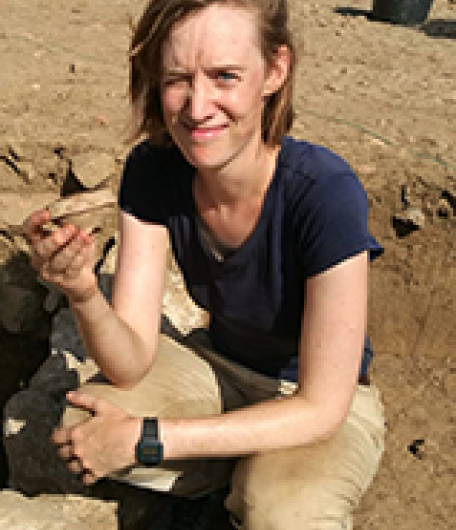

Astrid Van Oyen is Assistant Professor in Classical Archaeology and Emerson-Krapels Faculty Fellow at Cornell University. Her research focuses on the archaeology of Roman Italy and the Western provinces, exploring the social, cultural, and economic dimensions of empire, craft production, storage, and rural economies. She is author of How Things Make History: The Roman Empire and its Terra Sigillata Pottery (Amsterdam University Press, 2016) and co-edited Materialising Roman Histories (with Martin Pitts, Oxbow, 2017).
She co-directs the Marzuolo Archaeological Project (Italy), excavating the multi-craft rural site of Marzuolo (Tuscany, Italy) to explore craft and innovation in a rural community. Her most recent book project Storage and Empire traces the mental and practical reverberations of storage in the Roman world, an agrarian empire. See http://shc.stanford.edu/news/stories/storage-and-empire.
Roman archaeology
Material culture theory
Ancient economy
External Faculty Fellow, Stanford Humanities Centre, 2018-2019
Monograph
2016. How Things Make History. The Roman Empire and its Terra Sigillata Pottery. Amsterdam: Amsterdam University Press.
Edited volume
2017. A. Van Oyen and M. Pitts, eds. Materialising Roman Histories. Oxford: Oxbow.
Peer-reviewed journal articles
In press, 2019. Rural time. World Archaeology 50(5).
2017. Agents and commodities: a response to Brughmans and Poblome (2016) on modelling the Roman economy. Antiquity 91(359), 1356-1363.
2016. Historicising material agency: from relations to relational constellations. Journal of Archaeological Method and Theory 23, 354–378.
2015. The moral architecture of villa storage in Italy in the 1st c. B.C. Journal of Roman Archaeology 28, 97–124.
2015. The Roman city as articulated through terra sigillata. Oxford Journal of Archaeology 34(3), 279-299.
2015. Actor-Network Theory’s take on archaeological types: becoming, material agency, and historical explanation. Cambridge Archaeological Journal 25(1), 63-78.
2015. Deconstructing and reassembling the Romanization debate through the lens of postcolonial theory: from global to local and back?. Terra Incognita 5, 205-226.
2014. Les acteurs-réseaux en archéologie: état de la question et perspectives futures. Les Nouvelles de l’archéologie 135, 14-21.
2013. Towards a postcolonial artefact analysis. Archaeological Dialogues 20(1), 79-105.
Contributions to edited volumes
2018. Material Agency. In S.L. López Varela, ed. The Encyclopedia of Archaeological Sciences. Oxford: Wiley-Blackwell. https://doi.org/10.1002/9781119188230.saseas0363
2018. R.G. Vennarucci, A. Van Oyen, G.W. Tol. Cinigiano (GR). Una comunità artigianale nella Toscana rurale: il sito di Marzuolo. In V. Nizzo and A. Pizzo, eds. Antico e non antico. Scritti multidisciplinari offerti a Giuseppe Pucci. Sesto San Giovanni: Mimesis Edizioni, 589–597.
2018. Material culture and mobility: a brief history of archaeological thought. In C. Heitz and R. Stapfer, eds. Mobility and Pottery Production. Leiden: Sidestone Press, 53–65.
2017. Material culture in the Romanization debate. In A. Lichtenberger and R. Raja, eds. The Diversity of Classical Archaeology (Studies in Classical Archaeology 1). Turnhout: Brepols, 287–300.
2017. A. Van Oyen and M. Pitts. What did objects do in the Roman world? Beyond representation. In A. Van Oyen and M. Pitts, eds. Materialising Roman Histories. Oxford: Oxbow, 3–19.
2017. Finding the material in ‘material culture’: form and matter in Roman concrete. In A. Van Oyen and M. Pitts, eds. Materialising Roman Histories. Oxford: Oxbow, 133–152.
2016. Networks or work-nets? Actor-Network Theory and multiple social topologies in the production of Roman terra sigillata. In T. Brughmans, A. Collar and F. Coward, eds. The Connected Past. Network Studies in Archaeology and History. Oxford: Oxford University Press, 35–56.
2012. Knowledge systems in the production of terra sigillata. Moving beyond the local/global paradox. In M. Duggan, F. McIntosh and D.J. Rohl, eds. TRAC 2011. Proceedings of the Twenty First Theoretical Roman Archaeology Conference, Newcastle 2011. Oxford: Oxbow, 48-59.

